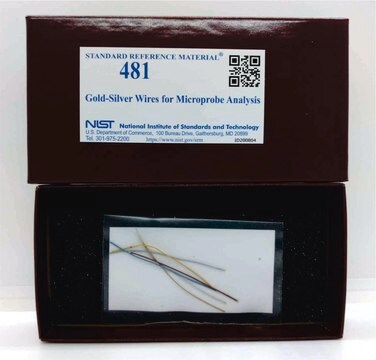310980
Gold
wire, diam. 0.5 mm, 99.99% trace metals basis
Sign Into View Organizational & Contract Pricing
All Photos(1)
About This Item
Empirical Formula (Hill Notation):
Au
CAS Number:
Molecular Weight:
196.97
EC Number:
MDL number:
UNSPSC Code:
12141717
PubChem Substance ID:
NACRES:
NA.23
Recommended Products
Assay
99.99% trace metals basis
form
wire
resistivity
2.05 μΩ-cm, 0°C
diam.
0.5 mm
bp
2808 °C (lit.)
mp
1063 °C (lit.)
density
19.3 g/mL at 25 °C (lit.)
SMILES string
[Au]
InChI
1S/Au
InChI key
PCHJSUWPFVWCPO-UHFFFAOYSA-N
Quantity
380 mg = 10 cm; 1.9 g = 50 cm
Storage Class Code
11 - Combustible Solids
WGK
nwg
Flash Point(F)
Not applicable
Flash Point(C)
Not applicable
Personal Protective Equipment
dust mask type N95 (US), Eyeshields, Gloves
Choose from one of the most recent versions:
Already Own This Product?
Find documentation for the products that you have recently purchased in the Document Library.
Customers Also Viewed
Tae-Sik Cho et al.
Journal of nanoscience and nanotechnology, 13(5), 3711-3714 (2013-07-19)
The crystallization of Au/glass ultrathin films for surface plasmon resonance (SPR) biosensor has been studied using synchrotron X-ray scattering and field emission scanning electron microscope. In films thinner than 30 nm, crystallized Au grains with [111] preferred orientation were formed
Yoon-Chae Nah
Journal of nanoscience and nanotechnology, 13(5), 3470-3473 (2013-07-19)
Au nanoparticles and poly(3-hexylthiophene) (P3HT) composite films were prepared by electrodeposition of Au nanoparticles using pulse-current electrodeposition followed by the spin coating of P3HT and their enhanced electrochromic coloration was investigated. A relatively uniformed Au nanoparticle was obtained by the
Young Min Bae et al.
Journal of biomedical nanotechnology, 9(6), 1060-1064 (2013-07-19)
We report on the enhancement of sensitivity of SPR biosensor by modifying the metal surface. A mixture layer, in which gold and dielectric medium coexist, was simply prepared by increasing the roughness of gold surface deposited onto a glass substrate
Midas touch in cardiology.
Marianna Karamanou et al.
European heart journal, 34(20), 1463-1464 (2013-07-11)
Young Joo Choi et al.
Journal of nanoscience and nanotechnology, 13(6), 4437-4445 (2013-07-19)
Gold nanorods (Au NRs) that absorb near-infrared (NIR) light have great potential in the field of nanomedicine. Photothermal therapy (PTT), a very attractive cancer therapy in nanomedicine, combines nanomaterials and light. The aim of this study was to elucidate the
Our team of scientists has experience in all areas of research including Life Science, Material Science, Chemical Synthesis, Chromatography, Analytical and many others.
Contact Technical Service


